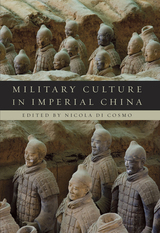
This volume explores the relationship between culture and the military in Chinese society from early China to the Qing empire, with contributions by eminent scholars aiming to reexamine the relationship between military matters and law, government, historiography, art, philosophy, literature, and politics.
The book critically investigates the perception that, due to the influence of Confucianism, Chinese culture has systematically devalued military matters. There was nothing inherently pacifist about the Chinese governments’ views of war, and pragmatic approaches—even aggressive and expansionist projects—often prevailed.
Though it has changed in form, a military elite has existed in China from the beginning of its history, and military service included a large proportion of the population at any given time. Popular literature praised the martial ethos of fighting men. Civil officials attended constantly to military matters on the administrative and financial ends. The seven military classics produced in antiquity continued to be read even into the modern period.
These original essays explore the ways in which intellectual, civilian, and literary elements helped shape the nature of military institutions, theory, and the culture of war. This important contribution bridges two literatures, military and cultural, that seldom appear together in the study of China, and deepens our understanding of war and society in Chinese history.


Wei Chuang was a prolific Tang dynasty poet. He not only wrote in the shih form (poems in the old and new styles, the latter having strict rules of meter, rhyme, and euphony), but also was one of two literati founders of the tz'u (lyric) tradition, based on a popular song form. This tripartite study provides a thoroughgoing picture of his life and work.
The book begins with the first detailed biography of Wei Chuang in a Western language, drawn both from historical sources and Wei's poetry. The shih poems are intensely autobiographical and provide insight into Wei's own experience and into the situation in China at the end of the ninth century. A second section analyzes the poetry, demonstrating that Wei's tz'u cannot be understood without reference to his shih compositions, a new approach to the totality of Wei's work. Finally, this volume presents translations, briefly annotated, of 110 shih poems, including his major narrative poem, The Lament of the Lady of Chin, and almost all the tz'u attributed to him, constituting more than a third of Wei Chuang's extant poetry. The translations, while hewing close in meaning to their Chinese originals, have considerable value as poems in English.
This work offers information that is useful to those interested in the literature, history, and general culture of medieval China. The translations bring to modern readers of English poetry the pleasures of becoming acquainted with a complex and innovative voice from the Chinese past.
READERS
Browse our collection.
PUBLISHERS
See BiblioVault's publisher services.
STUDENT SERVICES
Files for college accessibility offices.
UChicago Accessibility Resources
home | accessibility | search | about | contact us
BiblioVault ® 2001 - 2024
The University of Chicago Press









